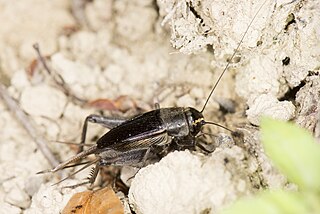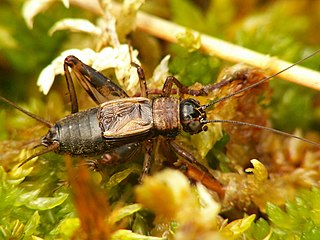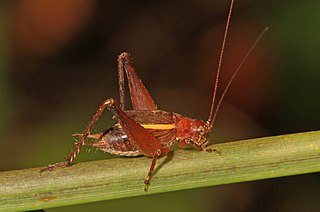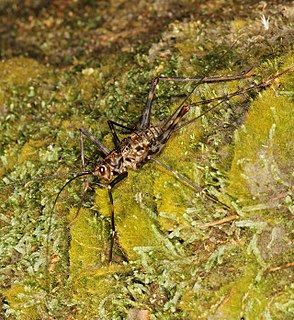
The family Gryllidae contains the subfamilies and genera which entomologists now term true crickets. They belong to the Orthopteran subfamily Ensifera, having long, whip-like antennae and has been reduced in terms of the older literature, with taxa such as the spider-crickets and allies, sword-tail crickets, wood or ground crickets and scaly crickets elevated to family level. The type genus is Gryllus and the first use of the family name "Gryllidae" was by Walker.

Trigonidiinae is a subfamily of insects in the order Orthoptera, suborder Ensifera, based on the type genus Trigonidium. They are often referred to as sword-tail crickets, winged bush crickets or trigs.

Teleogryllus is a genus of crickets in the family Gryllidae. Species can be found in: Africa, Asia, Australia and the Pacific islands.

Nemobiinae is a subfamily of the newly constituted Trigonidiidae, one of the cricket families. The type genus is Nemobius, which includes the wood cricket, but members of this subfamily may also be known as ground crickets or "pygmy field crickets".
Acanthoplistus is a genus of crickets in the tribe Gryllini; species are recorded from west Africa, with a discontinuous presence in India and Indo-China.

Loxoblemmus is a genus of crickets in tribe Gryllini. Species can be found in Africa, Asia and Australia.
Gymnogryllus is a genus of crickets in family Gryllidae and tribe Gryllini. Species are recorded from Africa, Asia and Australia.

Hapithinae is a subfamily of insects in the cricket family Gryllidae. It is one of several groups referred to in American English as "bush crickets", although this term can be confused with the Tettigoniidae.

Podoscirtinae is a subfamily of crickets in the family Gryllidae.
Pteronemobius is a genus of cricket in the subfamily Nemobiinae, with a worldwide distribution.

The Phalangopsidae are a recently reconstituted family of crickets, based on the type genus PhalangopsisServille, 1831 from South America. Priority for family-group names based on this genus dates from Blanchard's "Phalangopsites".
The Phaloriinae is a subfamily of crickets of the family Phalangopsidae. Species are terrestrial and are distributed in: Africa, tropical Asia, Korea, Australia and the Pacific Islands.

The Cachoplistinae is a subfamily of crickets of the family Phalangopsidae; they are sometimes called beetle crickets. Species are terrestrial, carnivorous or omnivorous and can be found in: Africa, tropical Asia, Korea and Japan.
Cacoplistes is the type genus of cricket in the subfamily Cachoplistinae; it has been placed in its own tribe, the Cachoplistini. Its recorded distribution is: India, southern China and Indo-China.
The Landrevinae are a subfamily of crickets, in the family Gryllidae, based on the type genus Landreva. They are terrestrial, omnivorous and may be known as "bark crickets"; genera are distributed in: Central and South America, Africa, tropical Asia, Korea, Japan, Australia and the Pacific Islands.

Gryllini is a tribe of crickets and typical of the family Gryllidae. Species are terrestrial, carnivorous or omnivorous and can be found in all continenents except Antarctica.
Euscyrtus is a genus of crickets in the subfamily Euscyrtinae. Species can be found mostly in Africa, Asia and Australia.
Phonarellus is a genus of crickets in the family Gryllidae and tribe Gryllini. Species can be found in mainland Asia, Japan and tropical Africa.
Duolandrevus is a genus of crickets in the subfamily Landrevinae and tribe Landrevini. Species can be found in Asia.
Modicogryllus is the type genus of crickets in the tribe Modicogryllini. Species have been recorded from: Europe, Africa, the middle East, temperate and tropical Asia through to Australia and western Pacific islands.









